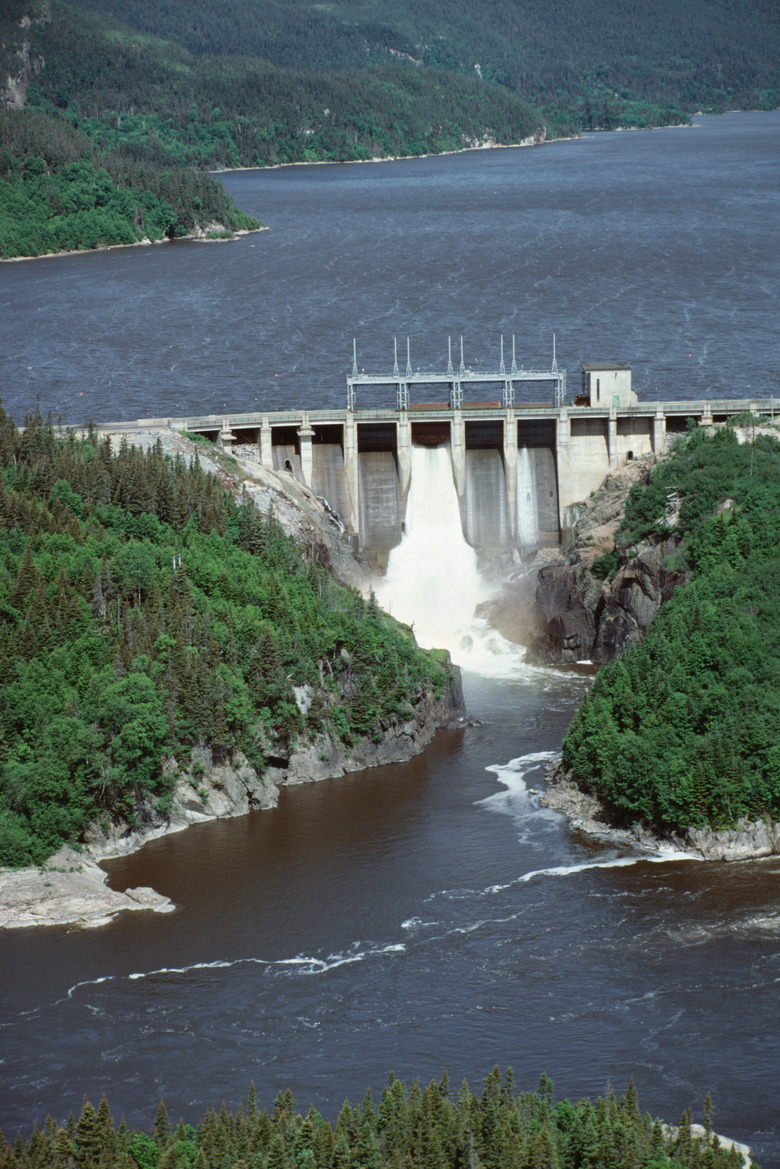What Are The Benefits Of Saving Electricity?
North Americans have grown accustomed to a lifestyle that was unknown to their forbears of earlier centuries and one that couldn't exist without electricity. The early 20th century saw the rapid development of hydroelectric and fossil fuel-powered generating stations, the environmental impact of which didn't become widely apparent until century's end. Perhaps the greatest benefit of conserving electricity in the 21st century is avoiding the need for even more generating stations.
Power Generation in the United States
Power Generation in the United States
Despite the existence of dams and hydroelectric power stations on many major waterways in North America, less than 10 percent of electricity consumed in the United States in 2011 originated from them. According to the United States Energy Information Administration, 42 percent of U.S. electricity came from burning coal, about 26 percent came from burning natural gas or petroleum, and about 19 percent came from nuclear generating stations. The amount of energy generated from renewable resources, such as biomass, geothermal and solar and wind power, was greater than in previous years, but it still accounted for only about 14 percent of the electrical consumption of American households and businesses.
The Hazards of Burning Fossil Fuels
The Hazards of Burning Fossil Fuels
One of the primary waste products from the burning of fossil fuels is carbon dioxide, which traps heat in the earth's atmosphere. The Union of Concerned Scientists reports that the average temperature on the surface of the planet has risen by more than 0.5 degree Celsius (0.9 degree Fahrenheit) since the late 1800s. Besides the probability that they cause global warming, fossil fuel emissions also cause air, water and soil pollution that can be responsible for respiratory and other ailments in humans, as well as damage crops. Coal mining and oil production have significant negative effects on the environment.
Rising Cost of Electricity
Rising Cost of Electricity
Demand for electricity will rise from 20 to 50 percent over the next 25 years without concerted efforts to conserve, according to the United States Environmental Protection Agency. This puts stress on the current energy-producing systems, leading to increased instances of blackouts or brownouts during high-demand periods and forcing electric companies to search for more ways to produce electricity. It also drives up the cost for consumers. As of 2012, the EPA reports that the average household utility bill was $1,900 per year and that the cost to cook dinner was rising faster than the cost of the food.
Benefits of Conservation
Benefits of Conservation
Conserving electricity benefits not only the individual household, but the community as a whole. By finding ways to cut back on electricity use, you lower your own electric bill, and if everyone does it, it reduces the total need for energy production. This means the environmental release of fewer greenhouse gases, fewer oil spills and fewer strip mines, as well as cleaner air to breathe, cleaner water to drink and better food to eat. It also means savings on energy-related activities, such as fuel transportation, which could translate into lower taxes. Another important benefit is decreased reliance on fuel from politically volatile locations around the globe.
Cite This Article
MLA
Deziel, Chris. "What Are The Benefits Of Saving Electricity?" sciencing.com, https://www.sciencing.com/benefits-saving-electricity-2569/. 24 April 2017.
APA
Deziel, Chris. (2017, April 24). What Are The Benefits Of Saving Electricity?. sciencing.com. Retrieved from https://www.sciencing.com/benefits-saving-electricity-2569/
Chicago
Deziel, Chris. What Are The Benefits Of Saving Electricity? last modified August 30, 2022. https://www.sciencing.com/benefits-saving-electricity-2569/
